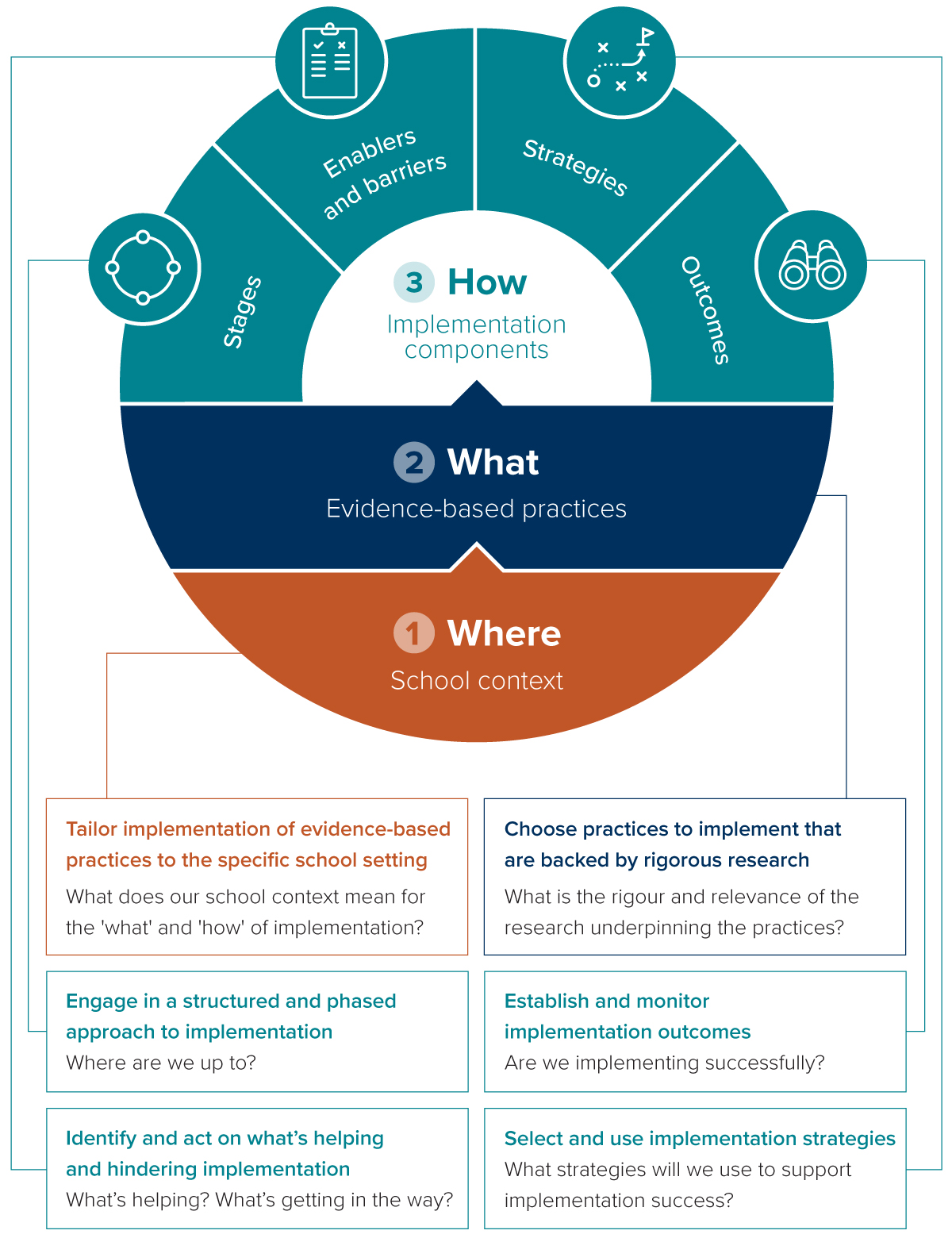
Joanne Gibbon is an educator at an AERO Learning Partner school in South Australia.
Schools and systems are increasingly drawing on evidence-based practices in their efforts to improve learning outcomes for all students. However, just knowing about evidence-based practices isn’t enough for schools to implement them effectively. The ‘how’ of implementation is just as important as ‘what’ is being implemented.
The Australian Education Research Organisation (AERO) has developed a deliberate and structured approach to implementation based on key concepts from research, designed to help schools embed evidence-based practices effectively. This approach recognises that each school is unique, with its own set of opportunities, strengths and contextual factors. The approach provides a clear structure but has room for flexibility, allowing schools to tailor implementation to respond to their specific needs.

Implementation takes place in schools – the ‘where’. It comes as no surprise that implementation must be tailored to each school's specific context. School context is woven throughout the implementation process and helps inform the choices schools make – for example, which evidence-based practice(s) to adopt, when to start an implementation process, and who’ll be involved in each stage of implementation. By adapting implementation efforts to contextual factors, schools can increase the likelihood of success.
Joanne Gibbon (pictured), Year 6 educator at Learning Partner school St Joseph’s in Murray Bridge, South Australia, said the '... partnership with AERO has been truly transformative. They've provided us with the essential tools and guidance to successfully implement explicit instruction across our entire school.
'Our teachers are now more confident and equipped with effective strategies, while our students are showing remarkable improvements in understanding and retaining key concepts. We've seen a noticeable boost in student engagement and achievement,' said Joanne.
Trinity Hook, Principal at Mount Hutton Public School in New South Wales, said a key lesson is the importance of gradual, supported change for all involved: 'We’ve been taking it step-by-step, providing our leaders and teachers with focused time on implementation and professional development.
'We’ve seen noticeable improvements in teacher confidence and student engagement from working with AERO. They have reinforced our belief that every child matters, every day – and they’re helping us better support all student’s learning.'
Selecting evidence-based practices is the ‘what’ of implementation. Evidence-based practices are those supported by research evidence and provide a good indication of what is likely to be effective for students’ learning.
The key components
Implementation components are the ‘how’ of implementation. There are 4 components that form part of a deliberate and structured approach to implementation:
- Use a staged approach: Implementation is viewed as a process that occurs in distinct, often overlapping stages: Explore, Prepare, Deliver and Sustain. Stages help schools plan and execute implementation efforts more effectively, recognising implementation is not a one-time event but a continuing process.
- Address enablers and barriers: Every implementation effort encounters factors that either help or hinder progress. Identifying enablers and barriers can help schools understand exactly what’s working and what’s getting in the way of implementation in their unique setting. Acting on this information by addressing enablers and barriers can help schools strengthen their implementation efforts.
- Use key implementation strategies: A wide range of strategies can support implementation in schools. These strategies are the practical how-to elements that turn research into practice, including developing a detailed implementation plan, providing professional learning followed by modelling and coaching and more.
- Implementation outcomes: Implementation outcomes are the effect of implementation and help to guide the implementation process. Strong implementation outcomes are a good indicator of future impact on student learning outcomes. Implementation outcomes include acceptability, feasibility and fidelity, which help schools evaluate and refine their implementation efforts.
AERO continues to work alongside schools to learn about effective approaches to implementing evidence-based practices in different school contexts. We are directly providing support and guidance to these schools to enact a deliberate and structured approach to implementation. These partnerships let us explore and refine our implementation approach with schools, gathering real-world insights that will inform future guidance for all educators.
AERO is learning about how schools implement evidence-based practices well and will be sharing our insights and understandings as we go. We will continue to develop and refine our approach to implementation to provide schools with further guidance to support bridging the gap between research and practice.
Read our discussion paper or subscribe to AERO’s mailing list for the latest updates on implementation.